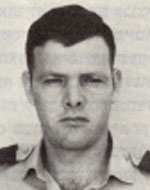Ehud, son of Sima and Bezalel, was born on August 16, 1942, in the village of Kadima, where his family lived in Netanya, where he studied at the Bialik Elementary School and the Tchernichovsky High School. As a child, Udi became a chubby child, quiet and timid and very attached to his family, and as a teenager he began to develop friendships that were built according to the pure and heartfelt truth that was so characteristic of him. With whom they were based on an emotional bond and boundless loyalty, and the fabric of the relationship between Ehud and his brothers – and among them their parents – was rare and unique: In these circumstances, it was natural that when he reached the age of conscription, in August 1960, Ehud followed his older brother and volunteered for the air force. Ehud’s natural pilot. Indeed, after the operational training course – the first line squadron of the air force, the Super Mister Squadron, it was not long before Ehud bought himself a place in the front row as a fighter pilot; When he was in the air he was found to have a tempestuous temperament, a quick decision, a goal and knew how to exploit any mistake or weakness of his opponent. At the same time a group of friends formed around him, with whom they had deep ties of friendship; For Ehud knew to be a true friend and always devoted and willing to help without limit. As one of the best pilots in the school, Ehud was chosen to be part of the aerobatic team, which came after exhaustive but full-fledged training for the spectacular performance of the wings. The period of his service at the School of Flight emphasizes his leadership ability, and for the first time he is given the task of management and command. From now on, the commander’s image begins to crystallize: devotion, responsibility, initiative, clear thinking, correct analysis, and above all, an attentive ear and concern for his subordinates. His aviation professionalism has turned him into an authority – a “model” and a figure enjoying confidence from his subordinates and commanders alike. Here he knows Tova, who works with him on the same basis, and in 1967 married her. With the birth of his two sons, Arnon and Oded, he tried to spend most of his free time with them. He would have enjoyed every stage of their development and his great love for them. With the Mirage, Ehud arrives at the Six-Day War in which he drops two enemy planes in air battles. During this period two Syrian MiG-17s are suddenly landing in the north of the country. The Air Force chooses two of its pilots to fly enemy planes to train all the other pilots and aircraft in air battles – one of the two pilots who fly the MiG is Ehud. After the war, he was again selected for his first trip to the United States with the first group of pilots to receive phantom aircraft, and he graduated with honors when his flight level aroused the admiration of his American instructors. As one of the pilot pilots, he participated in many missions deep into Egypt and was the first pilot to drop an enemy MiG-21 with the phantom jet, and from there Ehud serves in the flight school as a squadron commander. Once again, of all his school commanders, he was chosen for the senior position of his age and rank: Ehud was appointed as the chief instructor of the school. At the end of 1973 Ehud moved with his family toA base in the center of the country in preparation for receiving a command of a phantom squadron. But here comes the cruel and cruel war – the Yom Kippur War. On the morning of the second day of the war, Ehud is charged with attacking the missile batteries in Syria – an operation designed to allow freedom of operation for our planes against the Syrian armor that burst and flooded the Golan Heights. When he entered the attack, the target was discovered close to planned, a fact that placed a great deal of danger in the vicinity of the bombing. Ehud, cold-tempered and objective, did not hesitate! He went into an attack where he died. He was awarded the Medal of Valor for this operation. Ehud was laid to rest in the cemetery in Netanya. He left behind a wife and two sons, parents and brother.
